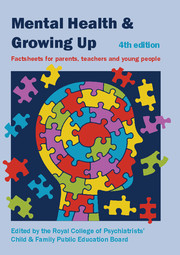Book contents
- Frontmatter
- Contents
- Contributors
- Factsheets for young people
- 1 Bipolar disorder
- 2 Cannabis and mental health
- 3 Cognitive–behavioural therapy (CBT)
- 4 Coping with stress
- 5 Depression
- 6 Drugs and alcohol
- 7 Exercise and mental health
- 8 Mental illness in a parent
- 9 Obsessive–compulsive disorder (OCD)
- 10 Psychosis
- 11 Schizophrenia
- 12 When bad things happen – overcoming adversity and developing resilience
- 13 Worries about weight and eating problems
- 14 Worries and anxieties
- 15 Who's who in child and adolescent mental health services (CAMHS)
- Factsheets for parents, carers and anyone who works with young people
9 - Obsessive–compulsive disorder (OCD)
from Factsheets for young people
Published online by Cambridge University Press: 02 January 2018
- Frontmatter
- Contents
- Contributors
- Factsheets for young people
- 1 Bipolar disorder
- 2 Cannabis and mental health
- 3 Cognitive–behavioural therapy (CBT)
- 4 Coping with stress
- 5 Depression
- 6 Drugs and alcohol
- 7 Exercise and mental health
- 8 Mental illness in a parent
- 9 Obsessive–compulsive disorder (OCD)
- 10 Psychosis
- 11 Schizophrenia
- 12 When bad things happen – overcoming adversity and developing resilience
- 13 Worries about weight and eating problems
- 14 Worries and anxieties
- 15 Who's who in child and adolescent mental health services (CAMHS)
- Factsheets for parents, carers and anyone who works with young people
Summary
What are the symptoms?
Obsessions
An obsession is a thought, image or urge that keeps coming into your mind even though you may not want it to. An obsession can be annoying, unpleasant or distressing and you may want it to go away. An example of an obsession is the thought that your hands are dirty even though they are not.
Different people have different obsessions – here are some examples:
• fears about dirt and spreading disease
• worrying about harm happening to you or someone else
• fearing that something ‘bad’ may happen
• worrying about things being tidy
• worrying about having an illness.
Having an obsession often leads to anxiety or feeling uncomfortable and you may then have the urge to ‘put it right’. This is where compulsions come in.
Compulsions
Compulsions are things you feel you need to do usually to control your ‘obsessions’, even though you may not want to. You might even try to stop doing them, but this might not be possible.
Often, a compulsion means doing something again and again as a ‘ritual’. By doing the compulsion, you feel you can prevent or reduce your anxiety about what you fear may happen if you don't do it. For example, turning the light on and off 20 times because you worry something bad may happen if you don't.
Different people have different compulsions. Some examples include:
• washing
• checking
• thinking certain thoughts
• touching
• ordering/arranging things or lining things up
• counting.
People who have these problems often try to avoid any situation that might set off these obsessive thoughts (e.g. not using hands to open doors). When obsessions and compulsions take up a lot of your time, interfere with your life and cause you distress, it may mean you have OCD.
Who does OCD affect?
Obsessive–compulsive disorder is common and can affect people of all ages irrespective of their background (gender, religion, class).
What causes OCD?
We do not know the cause of OCD for certain. However, research suggests that OCD may be due to an imbalance of a brain chemical called serotonin. It is likely that there may be someone in your family who has a similar disorder or have tics (jerky movements).
- Type
- Chapter
- Information
- Mental Health and Growing UpFactsheets for Parents, Teachers and Young People, pp. 26 - 28Publisher: Royal College of PsychiatristsPrint publication year: 2013



